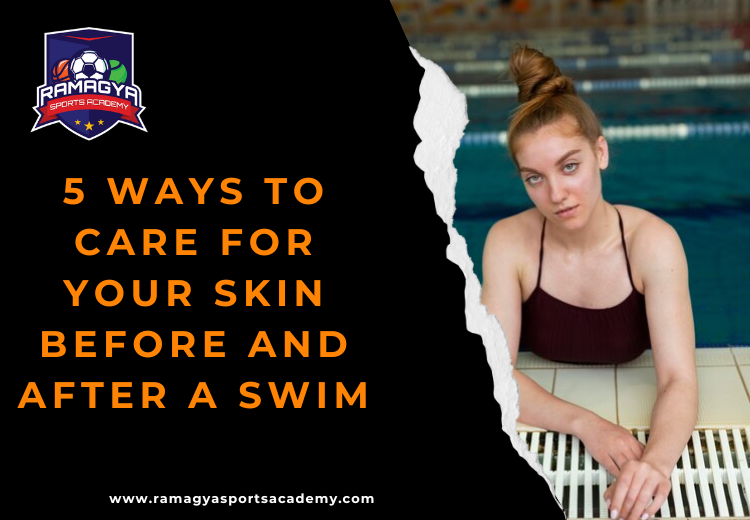
How to Prevent your Skin when Swimming Outside?
February 28, 2024
Unleash Your Potential with Knockout Boxing
March 4, 20245 Ways to Care for Your Skin Before and After a Swim
 Swimming is a fun way to bond with family and friends and keep cool during hot summer days. It is a sport that improves the mind, body, and soul in addition to providing physical activity. There’s no other sport like the feeling of calm and peace that results from the mixture of the euphoric feeling, the tranquil breath, and the soft hug of the water. Swim isn’t just an exercise option for lots of people; it’s an exercise in therapy, a means to have amusement, and also a means to express yourself. Swimming has benefits for anyone, whether the goal is to get healthier, decrease stress or take pleasure in the feeling of moving across the ocean. So, get into the water, make a splash and explore the unending possibilities of swimming.
Swimming is a fun way to bond with family and friends and keep cool during hot summer days. It is a sport that improves the mind, body, and soul in addition to providing physical activity. There’s no other sport like the feeling of calm and peace that results from the mixture of the euphoric feeling, the tranquil breath, and the soft hug of the water. Swim isn’t just an exercise option for lots of people; it’s an exercise in therapy, a means to have amusement, and also a means to express yourself. Swimming has benefits for anyone, whether the goal is to get healthier, decrease stress or take pleasure in the feeling of moving across the ocean. So, get into the water, make a splash and explore the unending possibilities of swimming.
- Hydrate Your Skin Before Swimming: One of the key questions when it comes to swimming is: “What to apply before swimming?” To protect your skin against saltwater and harsh chemicals before entering a pool or ocean environment, moisturize with moisturizing cream prior to swimming or heading into water bodies like pools. This will hydrate and protect it against saltwater intrusion and harsh chemicals present. To shield the surface of your body from UV radiation and keep moisture, you should start with moisturizers with an SPF of a minimum of 30. Pick a sunscreen that resists water and won’t easily wash off in water. Additionally, to keep your skin’s softness and suppleness prior to swimming, think about applying a lotion or oil which hydrates your skin. Before you go swimming, ensure that your skin is hydrated. This is crucial when your skin is exposed to the harsh environment of saltwater environments or pools that are treated with chlorine. Hydration is essential for your skin. It will not only help shield your skin from drying effects caused by pollution and salt however, but it also enhances the capacity of the skin to keep moisture, making it feel soft, smooth, and regenerated.
- Before and After Swim: Cleaning off after swimming can be essential in maintaining both hair and skin health. After exposure to chlorine, saltwater or any other potentially damaging chemicals that could alter its structure or function, cleansing of both body parts can help preserve their beauty and vitality. Prior to diving in the water it is also crucial that any impurities such as sweat, dirt or grime that might collect on its surface as well as skincare products that could otherwise clog your pores are fully removed before diving in the water. Pre-swim showering will keep your pores free of blockages and thus lower the risk of breakouts or blocked pores, thus decreasing breakouts or blockages during your swim session. Washing your face and hair before swimming can create an ointment that protects against chlorine and other chemicals commonly used in swimming pools, helping restore balance and hydration[1] levels for both hair and skin. Make sure to take extra special care with your locks since chlorine can strip natural oils from them causing them to dry and become brittle – use a soft towel after you’ve washed to soak up any remaining moisture from both scalp and locks.
- Maintain Hydrated and Healthy Skin: In order to keep your skin hydrated and healthy, swimming is a great way to expose it to potentially damaging saltwater and chlorine that could compromise its integrity and cause irreparable damage. In order to do this successfully, however, protection must also be provided against their potential ill effects on its condition. Eczema, psoriasis and dermatitis can all be made worse by exposure to chlorine or saltwater, leading to break outs and discomfort. Furthermore, chlorine exposure may result in “chlorine rash”, appearing as red and itchy patches on the skin. People with sensitive or reactive skin can find these effects particularly distressing; therefore it is crucial that preventative measures be taken in order to safeguard it. Furthermore, prolonged contact with chlorine and saltwater could accelerate facial ageing. Chlorine can lead to the breakdown of collagen and elastin proteins that help the skin stay firm and elastic, leaving behind wrinkles, skin sagging, fine lines and wrinkles as a result of chlorine exposure. Saltwater can dehydrate skin, leading to dry patches and wrinkles. Therefore, it is vital that we protect ourselves against its effects – along with chlorine’s – so as to maintain overall health and appearance of skin and keep looking its best.
- Moisturize and Nourish Your Skin After Swimming: Your skin must be nurtured and moisturized after swimming to maintain its health and hydration levels. Look for moisturizers with ingredients that draw and hold water into the skin such as Glycerin, Hyaluronic Acid or Shea butter to make sure that it stays nourished and hydrated. After swimming, immediately applying a moisturizer helps preserve skin hydration by locking in moisture and preventing dehydration. For additional nutrition and hydration of the skin, an oil or serum designed for body use may also provide beneficial support. Coconut, almond and jojoba oils contain many antioxidants and vitamins which are known to improve general skin health by strengthening and nourishing barrier function. As part of staying hydrated internally as well as externally moisturizing, be sure to drink plenty of fluids throughout the day – this helps increase overall moisture levels, prevent dryness and contributes to maintaining skin flexibility and health.
- Stay Hydrated and Eat a Balanced Diet: After swim, it is vitally important to replenish the body with essential nutrients and maintain overall health and wellbeing by drinking plenty of water and eating an appropriate and healthful meal. While swim, electrolytes such as sodium and potassium can be depleted from your system; additionally sweat can evaporate fluids that were once present within you body. Maintaining health and avoiding dehydration requires replenishing our bodies with electrolytes and fluids. Drinking electrolyte-rich drinks like coconut water or sports drinks combined with water can help replenish depleted electrolytes, as well as restore our equilibrium and overall wellness. Electrolytes play an integral part in general health as they regulate fluid flows as well as muscle contraction and nerve signal transmission – this makes electrolytes essential components of general wellbeing and performance.
Read our Article: How to Prevent your Skin when Swimming Outside?



